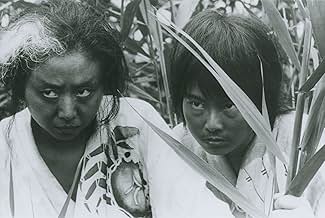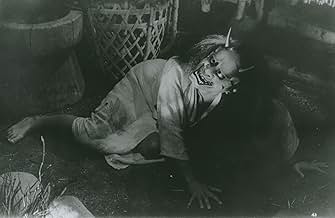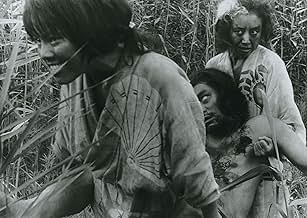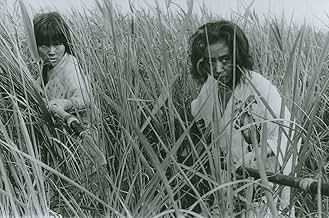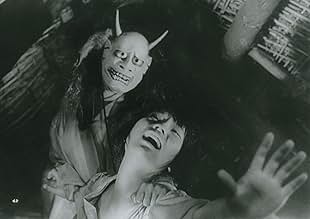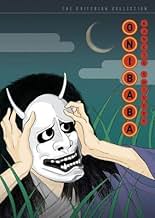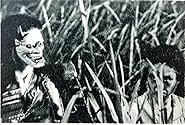NOTE IMDb
7,8/10
24 k
MA NOTE
Deux femmes tuent des samouraïs et vendent leurs biens pour gagner leur vie. Alors que l'une d'entre elles a une liaison avec son voisin, l'autre rencontre un mystérieux samouraï portant un ... Tout lireDeux femmes tuent des samouraïs et vendent leurs biens pour gagner leur vie. Alors que l'une d'entre elles a une liaison avec son voisin, l'autre rencontre un mystérieux samouraï portant un masque étrange.Deux femmes tuent des samouraïs et vendent leurs biens pour gagner leur vie. Alors que l'une d'entre elles a une liaison avec son voisin, l'autre rencontre un mystérieux samouraï portant un masque étrange.
- Récompenses
- 2 victoires au total
Avis à la une
"Battle not with monsters, lest ye become a monster, and if you gaze into the abyss, the abyss gazes also into you."
The characters in Onibaba dwell in the bottom rung of Maslow's Pyramid.
Food, sex, shelter, survival - though not necessarily in that order.
Sexuality permeates every frame of this film. It is ever-present along with the oppressive heat and the marshland weeds.
The stark black and white cinematography perfectly captures the desolate mood.
The score – atonal free jazz backed by tribal rhythms - though completely anachronistic works surprisingly well.
One of the most fiercely primal depictions of the human condition on celluloid, Onibaba is a hauntingly erotic masterpiece.
- Nietzsche
The characters in Onibaba dwell in the bottom rung of Maslow's Pyramid.
Food, sex, shelter, survival - though not necessarily in that order.
Sexuality permeates every frame of this film. It is ever-present along with the oppressive heat and the marshland weeds.
The stark black and white cinematography perfectly captures the desolate mood.
The score – atonal free jazz backed by tribal rhythms - though completely anachronistic works surprisingly well.
One of the most fiercely primal depictions of the human condition on celluloid, Onibaba is a hauntingly erotic masterpiece.
Onibaba is a supernatural horror film based on a Buddhist fable. It's about a couple of women in feudal Japan surviving the hardships of war by murdering and robbing stray samurais who wander unwittingly into their path. Their domain is a huge field of tall reeds with an ominous deep hole at its centre where they dispose of the unfortunate men they kill. Things are complicated when a male neighbour returns from the war and unleashes sexual tensions within the women which ends in horror. And that is to say nothing of the demon mask...
Onibaba is an artistically strong piece of cinema. From the outset the film is aurally intense, with repetitive beating drums announcing the beginning of the tale. The widescreen frame is consistently used brilliantly, with beautifully lit black and white photography. From the constantly swaying reeds to the close-ups of the protagonist's faces, the visuals capture the mysterious yet ominous beauty of the natural world, while emphasising the intense emotions of the protagonists. The setting ensures that the atmosphere is one of claustrophobia. In fact one of the themes of Onibaba is the way that the natural landscape can shape the way we are. The field of reeds allows the women to get close enough to kill warriors; it is one of the things that shapes them into killers, as it allows them to murder at will undetected. Similarly, the film is an allegory on capitalism. The war has forced these starving women to find their own way to survive the hardships all around them. They take extreme measures to feed the capitalist machine, as they murder and sell on that which they steal to a local low-life. Capitalism has dehumanised them and the black hole in the centre swallows up the victims. But aside from this, it is an intense human drama intertwined with eerie supernatural horror. The scenes near the end of the film with the demon in the reeds are beautifully creepy. While the horrific curse of the mask results in some scary and disorientating final scenes. In addition, there is a powerful depiction of female sexuality. These women are no shrinking violets. They are aggressive, amoral and deadly.
Onibaba is a film that is sumptuous both visually and aurally; yet its characters and story are devoid of beauty. It's one of the best examples of a horror art film.
Onibaba is an artistically strong piece of cinema. From the outset the film is aurally intense, with repetitive beating drums announcing the beginning of the tale. The widescreen frame is consistently used brilliantly, with beautifully lit black and white photography. From the constantly swaying reeds to the close-ups of the protagonist's faces, the visuals capture the mysterious yet ominous beauty of the natural world, while emphasising the intense emotions of the protagonists. The setting ensures that the atmosphere is one of claustrophobia. In fact one of the themes of Onibaba is the way that the natural landscape can shape the way we are. The field of reeds allows the women to get close enough to kill warriors; it is one of the things that shapes them into killers, as it allows them to murder at will undetected. Similarly, the film is an allegory on capitalism. The war has forced these starving women to find their own way to survive the hardships all around them. They take extreme measures to feed the capitalist machine, as they murder and sell on that which they steal to a local low-life. Capitalism has dehumanised them and the black hole in the centre swallows up the victims. But aside from this, it is an intense human drama intertwined with eerie supernatural horror. The scenes near the end of the film with the demon in the reeds are beautifully creepy. While the horrific curse of the mask results in some scary and disorientating final scenes. In addition, there is a powerful depiction of female sexuality. These women are no shrinking violets. They are aggressive, amoral and deadly.
Onibaba is a film that is sumptuous both visually and aurally; yet its characters and story are devoid of beauty. It's one of the best examples of a horror art film.
Onibaba is a very well done film, purposefully using black and white cinema to its' advantage in this stunning portrayal of murder, jealousy, and uncontrollable human instinct in a dark period of Japan's history.
A film that aims at portraying the baser side of human nature and investigating human psychology, it is chalk-full of symbolic scenes and sequences. From start to finish it draws you in with the odd imagery and scenery of Japan's rural areas, and even though in this film though there are very few characters and elements that are to it, both visually and literally, through its' minimalism it effectively tells its' story.
This film is both very artistic & symbolic as well as literal and upfront, juxtaposing very graphic, real images of the face of humanity that demand the viewer to infer much throughout the whole of the film. When going into this film, I would say that it is very important for the viewer to think of the film as being very symbolic for the instincts and base nature of mankind, and perhaps even a 'state of nature' portrayal of humanity. If you watch this film with that in mind, it will help with the inferences that one must make to get the most out of this film.
As it stands by itself, aside from the deeper meaning, it is an intriguing story that is a veritable 'slice of life' film in the darker sense, viewing the way that people had to live during a period of war and hard times in feudal Japan. It deals with the hardships that these people face, and their method of survival, in addition to a very human story of jealousy and portrayal with a very interesting culminating point that I did not expect at all. The climax of the film is very much worth the build-up, though at times it seemed to be rather slow.
Overall, a very important piece of film when it comes to the symbolism and techniques employed. Through its' minimalism and black-and-white cinematography we are really treated to a great film that is, of its' own right, an influential and great movie. The cinematography is exceptionally good, especially the use of the reeds and the light at night.
I would recommend this film to anybody with a serious interest in film, as well as anybody who likes a good film that investigates the darker side of human nature.
A film that aims at portraying the baser side of human nature and investigating human psychology, it is chalk-full of symbolic scenes and sequences. From start to finish it draws you in with the odd imagery and scenery of Japan's rural areas, and even though in this film though there are very few characters and elements that are to it, both visually and literally, through its' minimalism it effectively tells its' story.
This film is both very artistic & symbolic as well as literal and upfront, juxtaposing very graphic, real images of the face of humanity that demand the viewer to infer much throughout the whole of the film. When going into this film, I would say that it is very important for the viewer to think of the film as being very symbolic for the instincts and base nature of mankind, and perhaps even a 'state of nature' portrayal of humanity. If you watch this film with that in mind, it will help with the inferences that one must make to get the most out of this film.
As it stands by itself, aside from the deeper meaning, it is an intriguing story that is a veritable 'slice of life' film in the darker sense, viewing the way that people had to live during a period of war and hard times in feudal Japan. It deals with the hardships that these people face, and their method of survival, in addition to a very human story of jealousy and portrayal with a very interesting culminating point that I did not expect at all. The climax of the film is very much worth the build-up, though at times it seemed to be rather slow.
Overall, a very important piece of film when it comes to the symbolism and techniques employed. Through its' minimalism and black-and-white cinematography we are really treated to a great film that is, of its' own right, an influential and great movie. The cinematography is exceptionally good, especially the use of the reeds and the light at night.
I would recommend this film to anybody with a serious interest in film, as well as anybody who likes a good film that investigates the darker side of human nature.
Life's been tough, and you're surviving on the edge, trapping Samurai from flows in which you dredge, your often empty skillet, is sometimes, filled with millet, but at least your daughter in law helps you fetch. A neighbour returns home, with some bad news, your son, fallen in battle, no longer moves, it's not long before his wife, is causing stress, struggle and strife, behaving in a way you wholly disapprove. By fortune, you obtain a Hannya Mask, it comes in handy for a demonising task, a barrier of sorts, daughter in law's trips cut short, but there's no time to enjoy pleasures, or to bask.
Nobuko Otowa provides us with a truly outstanding performance as she grapples with her daughter in law's infidelity after the loss of her husband, leaving her isolated, alone and forgotten. The cinematography is sublime, the raw emotions unrefined, and the mask a cursed damnation that sticks and binds.
Nobuko Otowa provides us with a truly outstanding performance as she grapples with her daughter in law's infidelity after the loss of her husband, leaving her isolated, alone and forgotten. The cinematography is sublime, the raw emotions unrefined, and the mask a cursed damnation that sticks and binds.
Wow,I saw this movie on Cable recently.Both of the women in this story are just trying their best to get by and survive in a bad situation.I could tell it was on a limited budget but very well written.It was erotic with frontal nudity and even filmed in the 60's.It had me on the edge of my seat the whole time.I was trying to figure out where they were going with the whole thing.I kept trying to decide if I sympathized with the old woman more than the young one.Then at the end I felt sorry for both of them.What a great story.This one needs to be on Cable more often.This one is a must see even for people who only like contemporary films.I would recommend it to anyone.
Le saviez-vous
- AnecdotesOnibaba's literal meaning is demon hag or old devil woman.
- GaffesWhen the two soldiers get off their horses and start fighting in the river, the audio of the water splashing goes on and off. In addition, when the swords clash, there is no sound of clanging heard.
- Versions alternativesOriginally cut in England when released in 1968, though the video releases are uncut.
Meilleurs choix
Connectez-vous pour évaluer et suivre la liste de favoris afin de recevoir des recommandations personnalisées
- How long is Onibaba?Alimenté par Alexa
Détails
Box-office
- Montant brut mondial
- 689 $US
- Durée
- 1h 43min(103 min)
- Couleur
- Mixage
- Rapport de forme
- 2.35 : 1
Contribuer à cette page
Suggérer une modification ou ajouter du contenu manquant


